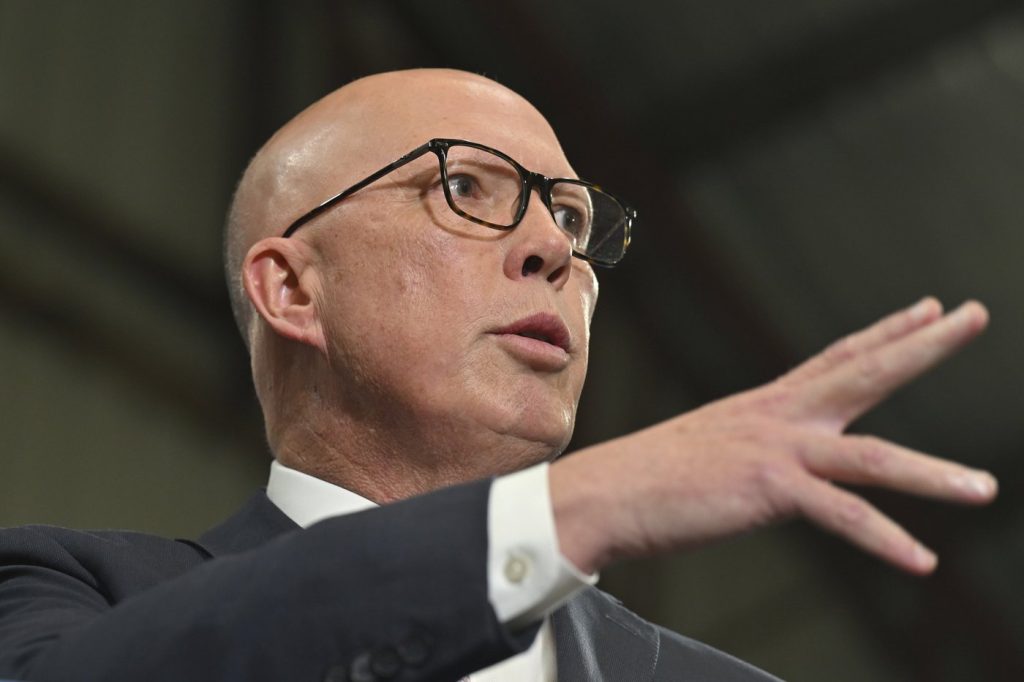MELBOURNE, Australia (AP) - Australia’s conservative opposition leader, Peter Dutton, a former police detective, is recognized for his stringent stance on border security and as a vocal critic of China. As Australia approaches its general elections on Saturday, the potential for Dutton to become prime minister is significant, marking a historical moment—the first instance since 1931 that an Australian government could be ousted after a single three-year term during challenging economic times.
A pivotal aspect of Dutton's campaign is his commitment to achieving net-zero greenhouse gas emissions by 2050 through nuclear power, contrasting with the current government's reliance on renewable energy sources. Since assuming leadership of the Liberal Party following their electoral defeat in 2022, Dutton has managed to maintain a united front within his party, a rarity in recent political history.
Political analysts, such as Monash University expert Zareh Ghazarian, suggest that Dutton has evolved from a confrontational figure to a more adaptable and considerate leader during his time in opposition. “He presented himself as a tough leader, but the more he has spent time in opposition, the more he has built his leadership repertoire,” Ghazarian remarked.
Dutton also foresees a shift in Australia’s international priorities, claiming that if elected, he would prioritize an initial visit to the United States to engage with President Donald Trump and negotiate favorable trade terms, in contrast to the customary first visit to a neighboring Asian country like Indonesia.
In 2019, Dutton faced backlash from Beijing after accusing the Chinese Communist Party of directing cyberattacks, stealing intellectual property, and suppressing free speech. The Chinese Embassy in Australia responded with a statement dismissing Dutton's accusations as “irrational” and “baseless.” Since the election of current Prime Minister Anthony Albanese in 2022, relations between Australia and China have shown signs of improvement, including the lifting of trade barriers that previously cost Australian exporters billions. Albanese has articulated a cooperative yet firm approach to dealings with Beijing, emphasizing collaboration in areas of common interest.
Contrarily, Dutton has promised a more uncompromising approach to China, asserting that he doesn't believe President Xi Jinping respects a weak Australian leadership. He criticized Albanese for what he termed “self-censorship” and labeled the PM's response to Chinese military maneuvers as inadequate.
Regarding his record in government, Dutton, 54, is affiliated with the most conservative faction of the Liberal Party and has held several ministerial roles since entering the Federal Parliament in 2001. His portfolio has included pivotal security positions like defense and home affairs. As Minister for Immigration and Border Protection from 2014, Dutton oversaw Operation Sovereign Borders, effectively reducing asylum-seeker trafficking by utilizing military strategies along Australia’s northern maritime borders.
Australia has faced criticism for its refugee resettlement policies, often redirecting arrivals to remote immigration camps in Papua New Guinea and Nauru. Drawing from nearly a decade of experience in the Queensland state police, Dutton's political ideology is heavily influenced by his background in law enforcement, focusing on addressing problems efficiently and systematically.
In summary, Peter Dutton's potential rise to the Australian premiership represents not just a shift in leadership but also a significant reorientation of the country’s domestic and international policy approaches, particularly concerning climate change and relations with China.











